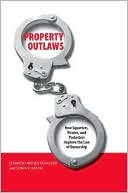Bar association Web sites often provide resources for free to the public (members get access to even more). The American Bar Association offers free podcasts and audio recordings in the multimedia section of ABANow, the Web site of the ABA’s media relations division. A lot of the material is promotional, but I like this podcast on one of the hottest topics in ethics right now, social media use by lawyers, entitled Beyond the Ethics of Web 2.0—What’s Now, What’s Next, What If. Download the podcast here, or listen to the recording on your computer.
 Cornell Law School is celebrating the publication of Prof. Eduardo Peñalver’s book Property Outlaws: How Squatters, Pirates, and Protesters Improve the Law of Ownership, which he co-authored with Sonia K. Katyal, Professor at Fordham University School of Law. The library catalog information for the book is available here. You can see the Table of Contents and read selected pages from the book at amazon.com.
Cornell Law School is celebrating the publication of Prof. Eduardo Peñalver’s book Property Outlaws: How Squatters, Pirates, and Protesters Improve the Law of Ownership, which he co-authored with Sonia K. Katyal, Professor at Fordham University School of Law. The library catalog information for the book is available here. You can see the Table of Contents and read selected pages from the book at amazon.com.
If you are intrigued by the concept of the role of the lawbreaker as a force in the evolution of property law, you can read an earlier treatment of the topic entitled “Property Outlaws,” co-authored by Professors Peñalver and Katyal in 155 U. PA. L. REV. 1095 (2007) and available in Scholarship@Cornell Law. The book expands the scope of the earlier article and also introduces the concept of “Altlaws.” Altlaws appear to violate the laws of intellectual property but “skirt the boundaries of property legality and can often make an objectively plausible argument that, although in a sense they are rebelling against the property status quo, their conduct actually falls within the boundaries of legal permissibility.” Altlaws push against the unclear boundaries of intellectual property law, as opposed to Outlaws who clearly operate outside the boundaries of property law.
For more of Professor Peñalver’s writings, see his faculty publications page and the Scholarship@Cornell Law online repository.
The New York Law Journal published a special report yesterday on law schools that has a lot of good information for current law students, including articles such as:
- Career Prospects in a Difficult Economy discusses how to make the best of the changing job market. Look for the quotation by Dean Schwab on page 3 of the article.
- Alternative Jobs. Probably several people have told you that you can do many things with a J.D., but what exactly are those “things” (besides practicing law, of course)? This article provides some answers to that question.
- How High is Your E.I.? (i.e., Emotional Intelligence) There’s a lot more to being a good lawyer than the ability to understand the U.C.C. Having a high emotional intelligence makes you not only more employable but also more successful after you get the job.
Anyone can view the special report for free by signing up for the digital edition with a name and email address.
For more information for Cornell Law students on accessing other articles from the NYLJ, see my blog post from a few weeks ago, Legal troubles of Yankee Stadium.
In “The Torture Lawyers” published at 51 Harv. Int’l L.J. 193 (2010) and available in Scholarship@Cornell Law, Cornell Law Professor Jens Ohlin examines the use of the justified necessity and excused necessity defenses by government agents who engaged in acts of what many consider to be torture during the Bush Administration. Professor Ohlin then discusses why Bush Administration attorneys who advocated the use of torture and may be considered accomplices in torture cannot successfully use these same defenses under the “flow-down” theory. To counter the objection that attorneys cannot be prosecuted simply for giving advice, Professor Ohlin examines two cases from the Nuremberg trials:
- Prosecutor v. Altstoetter et al. (the Justice Case), in which members of the German Justice Ministry were charged with giving legal effect to Nazi statutes and decrees that stripped the right to due process of law from many groups and individuals throughout Germany and German-controlled territories.
- United States v. von Weizsaecker et al. (the Ministries Case), in which members of Nazi ministries, including the Foreign Policy Office, were charged with war crimes stemming from their advisement of Nazi leaders regarding the deportation of Jews to concentration camps and other actions.
For other work by Professor Ohlin, see his faculty publications page. I recommend the following:
- “The Law as Cruelty: Torture as an International Crime,” 6 Journal of International Criminal Justice (guest editor with G. P. Fletcher) Special Issue, (2008); and also
- Defending Humanity: When Force is Justified and Why (with G. P. Fletcher) (Oxford University Press, 2008).
 Did you know that although the first Earth Day was founded by a U.S. Senator, its successful organization was actually coordinated by a law student? Denis Hayes, who later became an environmental lawyer, was, needless to say, preoccupied by issues other than his final exams at Harvard’s Kennedy School of Government in the spring of 1970.
Did you know that although the first Earth Day was founded by a U.S. Senator, its successful organization was actually coordinated by a law student? Denis Hayes, who later became an environmental lawyer, was, needless to say, preoccupied by issues other than his final exams at Harvard’s Kennedy School of Government in the spring of 1970.
If you are looking for a few moments of pleasant diversion during this 40th Earth Day, I recommend relaxing with a book from the Cornell University Library that celebrates the earth. Some to consider are:
- A Sand County Almanac, by Aldo Leopold;
- Desert Solitaire, by Edward Abbey;
- The Beauty of the Beastly, by Natalie Angier;
- Most anything by Henry David Thoreau;
- The Snow Leopard, by Peter Matthiessen;
- Never Cry Wolf, by Farley Mowat;
- And one of my favorites—Prodigal Summer, by Barbara Kingsolver.
In any of these books you will find the inspiration you need to take a break from your studies and take action on this Earth Day.
Image “An Unreal View of Earth” courtesy of NASA
The end of the semester draws near, so it’s time to start thinking about whether you’ll need your law school Lexis and Westlaw accounts this summer. Full access to Lexis and Westlaw is turned off May 31 and does not reactivate until August. However, if you meet one or more conditions you can extend your password for the summer—maintaining the access you have while in school. These conditions cover various non-commercial activities, including public interest work, working as a faculty research assistant, journal or moot court research, and bar review. A major new development this year is the addition of Lexis’ ASPIRE program, which is specifically designed for students and graduates doing public interest work.
Passwords must be extended by May 31. Basically, you’ll complete an online form indicating to Lexis and West why you need full access during the summer. Complete extension details for both Lexis and Westlaw are provided here.
You can gain vital research skills for your career with one of the six courses offered next year by the Research Attorneys. Most of the courses last just 6½ weeks – you have room in your schedule for that! Take your pick from:
- Administrative Law Research (one credit)
- Business Law Research (one credit)
- International and Foreign Legal Research (two credits)
- Online Legal Research: Free Sources (one credit)
- Online Legal Research: Subscription Sources (one credit)
- U.S. Legal Research for LL.M. Students (one credit)
You can read full descriptions and contact the course instructor for more information.
Next year the three-credit Advanced Legal Research seminar will not be offered. So take advantage of this large number of research options in a course or two of your choice. The skills and confidence you will gain are invaluable!
Now is the time to set up a research consultation to prepare for your summer job. An appointment with a Research Attorney is the perfect way to get ready for your summer employment, whether you are clerking for a judge, working in a law firm, volunteering for a nonprofit, or researching for a professor. You can set up a mutually convenient time with the Research Attorney of your choice (or indicate no preference) using the online form. Let us know where you will be working and how we can help you. Maybe you want to know how to:
- research the law in a specific state;
- research the law in a particular area of practice like securities law;
- improve your Westlaw or Lexis skills;
- research non-legal topics such as company research;
- hone your existing skills in a particular area;
- get a quick refresher in the basics.
Appointments last about 15 minutes to an hour depending on your needs, and you leave with a handout listing materials to help you over the summer. We guarantee that a consult will be useful to you in the real world and encourage you to meet with us one-on-one.
Want to be prepared to practice in a world of international and transnational law? Most of you will face issues involving transnational law—are you ready? An easy way to learn the basics is to use the Global Issues series on reserve in the Law Library. These slim volumes supplement law school courses from contracts to torts and give you an overview of key concepts along with comparisons to U.S. law. Each title includes narrative explanations and excerpts from articles, government documents, and cases. Most importantly, the books quickly get to the point. We will be adding titles on more areas of law as they become available. More are on the way, but right now we have the following Global Issues in…:
- Constitutional Law
- Civil Procedure
- Contract Law
- Corporate Law
- Criminal Law
- Employment Discrimination Law
- Employment Law
- Family Law
- Income Taxation
- Labor Law
- Legal Ethics
- Property Law
- Tort Law
We have ordered these Global Issues in…:
- Copyright
- Employee Benefits Law
- Environmental Law
- Freedom of Speech and Religion
- Intellectual Property Law
Check reserve items out for two hours at a time or overnight from the Law Library circulation desk.




